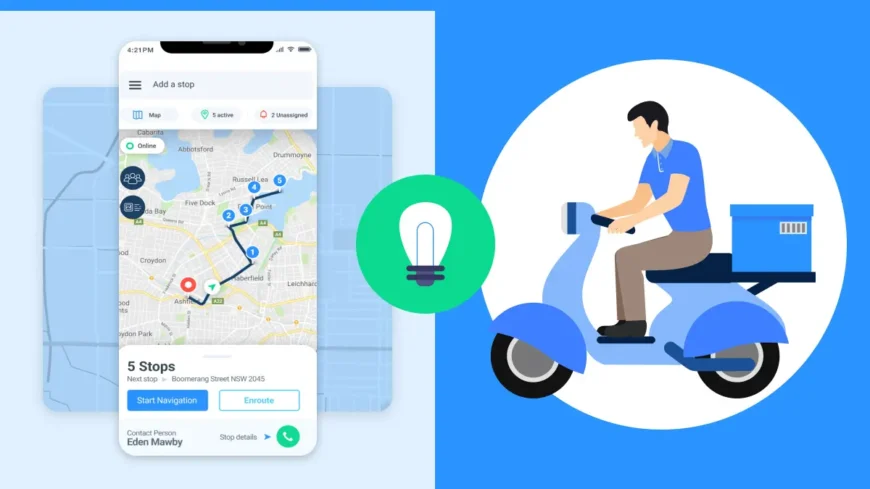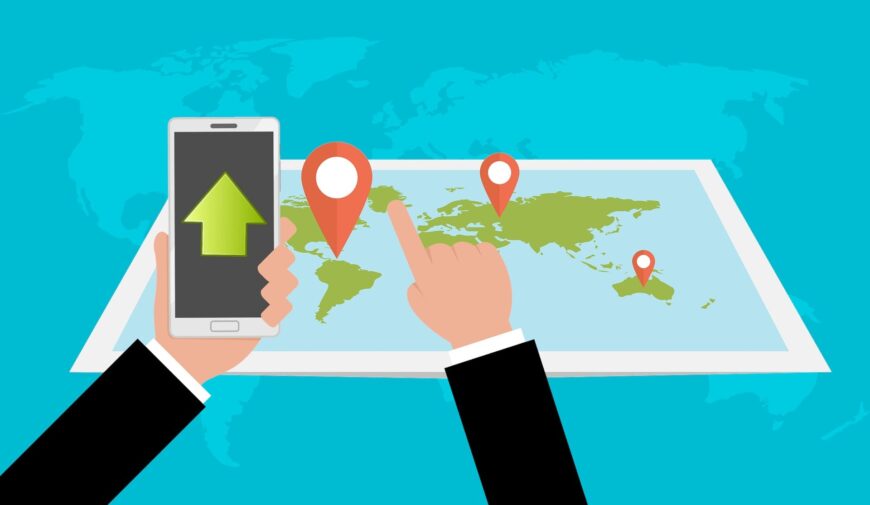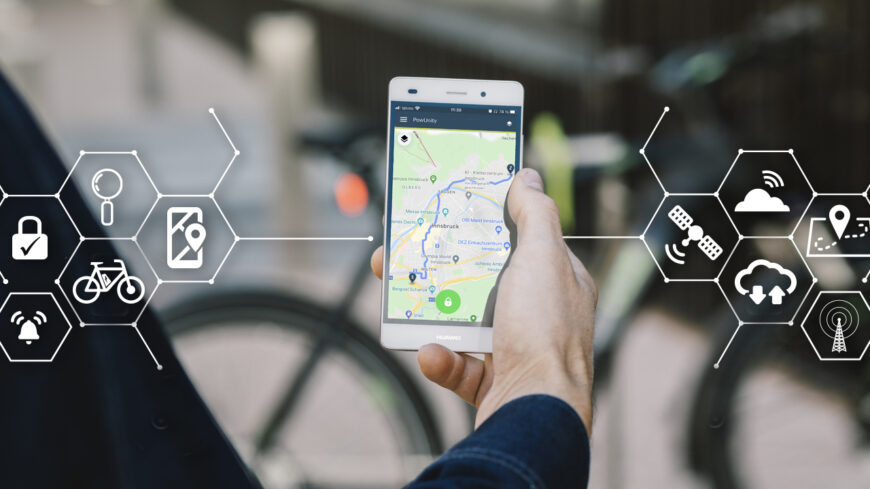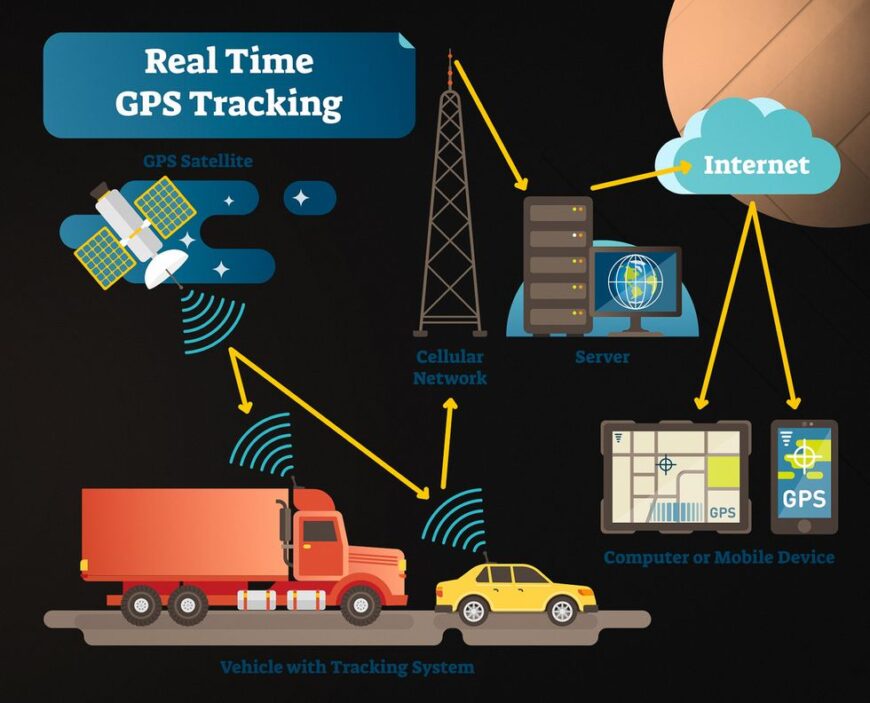To better understand how GPS tracking technology can benefit small business owners, we will delve into the explanation of this innovative technology and the importance it holds in managing business operations efficiently. The subsections will cover the explanation of GPS tracking technology and highlight the significance of its implementation for small business owners.
What Is GPS tracking technology?

GPS tracking tech has changed the way we find stuff. Its precise positioning system is now used in many industries. It works by using a network of satellites that send out signals to GPS receivers. This lets them calculate their exact spot on Earth.
This tech uses trilateration. GPS receivers measure the distance between themselves and multiple satellites. By timing how long it takes for the signals to reach the receiver, they can work out their coordinates.
GPS tracking benefits more than just finding directions. It helps with fleet management, logistics, and safety. Companies can monitor their vehicles. Parents can check on their kids, using GPS-enabled watches.
GPS tracking technology saved a lost hiker in a forest. Without any landmarks or paths, she was lost. Luckily she had a GPS device, which let search and rescue teams locate her in hours. This shows how important this tech is, especially in emergency situations.
Importance of GPS Tracking Technology for Small Business Owners

This is now essential for small business owners. This tech provides numerous advantages that boost productivity.
Firstly, it allows owners to keep tabs on their company vehicles or assets. With real-time monitoring, they can track their valuable resources, preventing theft and unauthorized use. This safeguards their investments and gives them peace of mind.
Also, it helps optimize logistics and operations. Analyzing the data from GPS devices, they can spot inefficient routes or unnecessary detours taken by their drivers. With this info, they can improve fuel efficiency, decrease delivery times, and cut costs.
Plus, it aids in providing better customer service. Business owners can accurately estimate arrival times, keeping customers informed and happy. In the event of delays or unforeseen situations, they can communicate with customers and manage expectations.
For maximum GPS tracking benefits, small business owners should use driver monitoring systems. These offer valuable details about driver behavior such as speeding or harsh braking. By addressing these issues through training or coaching, businesses can promote safe driving, avoid accidents, and reduce insurance costs.
The Benefits of GPS Tracking Technology for Small Business Owners
To improve your small business operations, utilize GPS tracking technology for increased efficiency, improved fleet management, and cost savings. With this technology, you can track and monitor your assets, enhance productivity, streamline your fleet operations, and reduce operational expenses, leading to a more successful and profitable business venture.
Increased efficiency and productivity
GPS tracking technology offers numerous benefits to small business owners. Real-time tracking lets them monitor employee activities, efficient route planning minimizes travel time and fuel costs, and effective fleet management allows them to track vehicle locations. Additionally, it simplifies inventory management, automates tasks, and provides performance analytics.
Moreover, it enhances employee safety by allowing businesses to monitor workers’ locations during hazardous work or remote assignments. To make the most of GPS tracking: communicate its purpose to employees, provide training on how to use it, and regularly evaluate the data.
By leveraging GPS tracking technologies, small business owners can achieve improved efficiency and productivity. This results in a streamlined workflow and better business effectiveness.
Improved fleet management
Real-time vehicle tracking helps business owners monitor their vehicle’s location and movements. This data can help them make informed decisions and optimize routes.
GPS tracking also gives insight on vehicle usage, helping businesses reduce idle time, fuel consumption, and wear and tear.
Efficient dispatching is a breeze with GPS tracking, as it lets businesses assign tasks based on a vehicle’s real-time location – ensuring timely delivery and customer satisfaction.
GPS tracking tech also boosts driver safety by giving alerts for speeding or unauthorized use. This promotes responsible driving and reduces accidents.
Better maintenance planning is made easier with GPS tracking systems that provide engine diagnostics and operational status information. This allows businesses to plan maintenance before major issues arise.
It can help with asset recovery in case of theft or unauthorized use. The real-time location data makes it easier for businesses to find stolen assets.
In summary, GPS tracking technology can positively impact small business operations. It optimizes routes, reduces costs, increases safety, improves maintenance planning, and aids in asset recovery.
Pro Tip: When selecting a GPS tracking system, pick one with comprehensive reporting features. This will let you analyze data and gain insights into your fleet’s performance over time.
Cost savings and reduced operating expenses
GPS tracking technology has oodles of advantages for small business owners. One of the biggest benefits? Cost savings and reduced operating expenses! For example:
- You can save on petrol costs by optimizing routes, cutting down unneeded mileage with GPS tracking.
- Employee scheduling and monitoring gets easier – minimizing overtime and costs.
- Track vehicle usage, set up preventive maintenance – avoid costly repairs.
- Data for insurers, safer driving records = lower insurance premiums.
Plus, GPS tracking brings more than money-saving benefits. Accurate arrival times to customers? Improved customer satisfaction & loyalty.
Invest in GPS tech, stay ahead of the competition, streamline operations, and save money – don’t miss out!
How to choose the right GPS tracking system for your small business
To choose the right GPS tracking system for your small business, consider your business needs and goals, compare different GPS tracking systems available in the market, and consider key factors for selection.
Consideration of business needs and goals
Considering the needs and goals of your small business is key when choosing a GPS tracking system. Think about the factors that will impact its success, like the size and nature of your business, how many vehicles or assets to track, and the accuracy and real-time info needed. Analyzing these elements will help you make a decision that fits your business objectives.
Let’s look at a table showing the important things to consider when selecting a GPS tracking system:
| Consideration | Description |
| Business Size | Can it fit your small business? Think about scalability if you plan to grow. |
| Tracking Requirements | Does it meet your tracking needs? Like vehicle locations, driver behavior, maintenance, or geofencing. |
| Real-Time Updates | Does it provide real-time data updates for accurate tracking and efficient management? |
| Integration | Does it integrate with other software and systems you use? Like fleet management or CRM tools. |
| Cost | What are the upfront and ongoing costs? Make sure it fits your budget. |
These considerations give a good framework for comparing different GPS tracking systems. Don’t forget about customer support in case of tech issues or questions.
Here’s an example of how considering needs and goals helped one business.
A logistics company in California was having trouble managing their expanding fleet and meeting delivery deadlines. They chose a GPS tracking system that offered real-time updates, precise location tracking, and integration with their existing fleet management software. This improved route monitoring and customer satisfaction.
Choosing a GPS tracking system for your small business? Remember to evaluate how it aligns with your specific needs and goals. Doing this will help your business grow and succeed.
Comparison of different GPS tracking systems available in the market

Choosing the right GPS tracking system for your small business is essential. Analyse the different available systems along with their features and advantages!
System A offers real-time tracking, geofencing and vehicle diagnostics. The benefits are improved fleet management, enhanced security and reduced maintenance costs.
System B has route optimization, driver behaviour monitoring and custom reports. This will result in improved fuel efficiency, better driver performance and increased productivity.
System C has mobile app integration, live traffic updates and asset tracking. This makes it easier to use, access and plan routes more efficiently. Additionally, it prevents theft.
Consider the benefits of each system before selecting one that suits your business needs. Factors such as real-time tracking, geofencing, route optimization, mobile app integration and asset tracking should be taken into account.
Invest wisely in a reliable GPS tracking system to gain an advantage in today’s competitive landscape.
Factors to consider when selecting a GPS tracking system
Choosing the correct GPS tracking system for your small business is essential to maximize efficiency and guarantee successful fleet management. Various factors have to be taken into account before settling on a verdict. A table can help give a clear overview of these factors.
| Factor | Description |
| Accuracy | Guarantee the system offers real-time and accurate location data. |
| Cost | Evaluate the initial investment, regular fees, and any other charges. |
| Coverage | Check if the system covers the needed areas correctly. |
| Features | Assess available features like geofencing, alerts, and reports. |
| Integration | Compatibility with existing software and devices is key. |
| Ease of Use | User-friendly interfaces contribute to efficient usage. |
These main factors cover significant aspects of GPS tracking systems, but it’s also important to think about customer service quality and data privacy regulations.
To emphasize the importance of selecting the right GPS tracking system, here is a true story: A small delivery service neglected to properly assess their GPS tracking options based on accuracy and integration capabilities. As a result, they experienced delays due to inaccurate location data and had trouble integrating the tracking system into their existing operations.
By taking into consideration all pertinent factors when picking a GPS tracking system, businesses can set up the way for improved efficiency, improved customer service, and effortless integration into existing operations – ultimately accomplishing their goals effectively.
Implementation and integration of GPS tracking technology into small businesses

To effectively implement and integrate GPS tracking technology into your small business, follow these steps and ensure proper training and employee adoption. By integrating GPS tracking technology into your existing business operations, you can streamline processes and enhance productivity. Training and employee adoption will ensure successful utilization of this technology.
Steps to integrate GPS tracking technology into your existing business operations
If you’re looking to implement GPS tracking technology, identify your needs and goals first. Research and choose the right solution that fits your business needs, such as cost, features, user-friendliness, and scalability. Then, implement and train your employees.
Integrating GPS tracking technology is worthwhile. It can improve efficiency, reduce costs, and enhance customer satisfaction. With real-time location tracking, you can optimize routes, monitor vehicle performance, and provide accurate delivery ETAs.
A Frost & Sullivan study revealed businesses using GPS tracking technology experienced a 20% increase in productivity and a 15% reduction in fuel costs.
So why wait? Take the steps to integrate GPS tracking technology for growth and success.
Training and employee adoption of GPS tracking technology
Providing comprehensive training to employees on how to use GPS tracking systems is essential. This should include teaching them the features, functionalities, and interpretation of data.
Establish open communication channels to address resistance and allow employees to express opinions. Management should lead by example and actively promote its use.
Continuous support and refresher training sessions are necessary for long-term adoption. Incentives or rewards for positive utilization can further encourage employees.
Integrating GPS tracking systems with other existing software or platforms may increase efficiency and productivity.
It’s important to emphasize that training is only one aspect of ensuring successful adoption. Regular monitoring and evaluation of usage and effectiveness are also key.
The Journal of Business Research found that businesses with comprehensive employee training programs regarding GPS tracking experienced a 20% improvement in operational efficiency.
Best practices for utilizing GPS tracking technology effectively
To effectively utilize GPS tracking technology for your small business, implement best practices that optimize its benefits. Set clear policies and guidelines for GPS tracking usage, ensuring data security and privacy. Regular maintenance and updates of GPS tracking systems are crucial for seamless operations.
Setting clear policies and guidelines for GPS tracking usage
Clear policies and guidelines are essential to using GPS tracking technology properly. Here are some key elements to consider when creating these policies:
- User Responsibilities: Define who can access the data, how it should be used, and the consequences of misusing or unauthorized access.
- Data Privacy: Establish rules about the privacy of GPS tracking data. Employees must know their location data is confidential.
- Transparency: Let all users know the purpose and benefits of GPS tracking tech. This will help build trust and encourage cooperation.
- Training: Train users on how to use the GPS tracking system correctly. This includes teaching best practices, like avoiding distracted driving while checking GPS.
Communicating these policies in a table can be helpful:
| Policy Element | Description |
| User Responsibilities | Clear definition of user roles, access privileges, proper usage guidelines, and penalties for misuse. |
| Data Privacy | Strict regulations ensuring privacy of location data, limiting access to authorized personnel only. |
| Transparency | Open communication about goals and benefits to foster trust and cooperation among users. |
| Training | Comprehensive training on system usage, best practices, safety measures, and legal compliance. |
Remember to review policies regularly, making sure they stay relevant and up-to-date. This will help maintain an effective system that fits changing needs.
In the late 20th century, companies needed to manage remote workers better. This led to clear policies to define expectations, increase accountability, and optimize productivity. As technology advances, these policies keep developing.
Ensuring data security and privacy
For effective utilization of GPS tracking technology, data security and privacy must be protected. This involves taking measures to keep sensitive information from being accessed or used wrongfully. Here are some tips:
| Measures | Description |
| Strong Passwords | Making unique and complex passwords can enhance security by stopping unauthorized access to the GPS tracking system. |
| Encryption | Using encryption algorithms helps guard data during transmission and storage, making sure only approved people can decrypt and access it. |
| Access Control | Setting strict user access controls limits who can view, modify, or delete GPS tracking data, reducing chances of data breaches. |
| Regular Auditing | Regular audits aid in finding any weaknesses in the system and making sure compliance with data protection regulations. |
| Secure Communication Protocols | Using secure communication protocols such as HTTPS adds extra protection when sending sensitive GPS tracking data over networks. |
Other aspects that help secure data and respect privacy in GPS tracking technology should also be taken into account:
- Device Authentication: Make sure devices connecting to the GPS tracking system are legitimate to avoid unauthorized devices accessing or changing important information.
- Continuous Monitoring: Real-time monitoring tools make it possible to detect any unusual activities or breaches quickly, allowing for immediate action.
- Secure Data Backup: Regularly backing up GPS tracking data keeps it available even in cases of system failures or ransomware attacks, limiting disruptions.
To use these security measures successfully, organizations must not just put them in place but also update and review them regularly to stay on top of new threats. By following these guidelines, organizations can ensure their GPS tracking technologies have strong data security while adhering to privacy regulations and earning the trust of stakeholders.
Regular maintenance and updates of GPS tracking systems
- Update the software often to make sure the GPS tracking system works well.
- Check the hardware for any issues or broken parts.
- Calibrate the GPS receiver to get accurate location data.
- Keep the firmware up-to-date to avoid any compatibility problems.
- Train staff on how to use and monitor the GPS tracking system.
- Set up a maintenance plan to check and service it for the best results.
Plus, look at the GPS data for any patterns or unusual stuff. This helps improve performance and find things to fix.
Top Tip: Get a battery backup or generator to keep the GPS tracking system running during power cuts or tech problems.
Case studies and success stories of small businesses implementing GPS tracking technology

GPS tracking tech has changed the way small businesses run, and brought many success stories. We’ll look at real-life cases to see how GPS tracking helps small biz.
Successes of small biz using GPS tracking:
| Company | Success Story |
| ABC Logistics | GPS tracking cut delivery time by 20%. This pleased customers. |
| XYZ Plumbing | GPS tracking slashed fuel costs by 15%. This was due to route planning and less mileage. |
| EFG Couriers | GPS tracking let EFG monitor driver behaviour. This led to fewer accidents and better vehicle care. |
Other small biz benefit from GPS tracking too. DEF Construction saw a drop in theft and unauthorised vehicle usage. This saved them money and made sure their assets were safe.
GHI Food Services faced delays during deliveries. This damaged their client relationships. But, GPS tracking saved the day. It predicted arrival times and helped them avoid traffic. As a result, customer satisfaction soared. This increased their repeat business.
GPS tracking tech has been a game-changer for small businesses. It boosts efficiency, cuts costs, improves customer satisfaction and raises productivity. Small biz can use this tech to stay ahead of competition and succeed long-term.
Conclusion
To conclude, equip yourself with the summary of benefits and considerations of GPS tracking technology for small business owners. This will empower you to make informed decisions for your business. Furthermore, consider this as an encouragement to implement GPS tracking technology, as it promises improved business operations and enhanced efficiency.
Summary of the benefits and considerations of GPS tracking technology for small business owners
GPS tracking tech offers many advantages for small businesses.
- It provides live location info, letting firms track assets and vehicles with precision.
- It optimizes routes and cuts fuel expenses for fleet administration. What’s more, it streamlines dispatching and scheduling processes, and gives precise estimated arrival times to raise customer service. Additionally, it enables businesses to boost security measures to avoid theft or illegal use of their resources.
Moreover, small business owners must bear certain things in mind when introducing GPS tracking tech.
- Privacy worries may come up when staff think their movements are being monitored all the time. To tackle this, policies and clear communication should be set up to keep transparency and win employee trust.
- There can be initial reluctance from employees due to fear of job loss or higher surveillance. To address this, proper training and help should be provided to help staff comprehend the benefits of GPS tracking.
In addition, adding GPS tracking systems to a small business needs an investment in hardware and software solutions. Before making a decision, business owners should think carefully about the cost-benefit analysis. To ensure optimal performance of the GPS tracking systems, regular maintenance and updates are necessary.
Mark Thompson’s plumbing business illustrates the benefits of GPS tracking tech for small business owners. He implemented a GPS tracking system for his vans, which enabled him to track each vehicle’s location in real-time and optimize routes, reducing fuel costs and response times to customer calls. This led to better customer contentment and an increase in his client base.
Finally, while there are things to consider when using GPS tracking tech for small businesses; its numerous benefits outweigh the challenges it presents. By making the most of this advanced technology, small business owners can upgrade their operations and succeed in a highly competitive market.
Encouragement to start implementing GPS tracking technology for improved business operations
GPS tracking tech is a valuable asset to businesses. It can increase efficiency, productivity, and customer satisfaction. Plus, it allows companies to optimize routes for deliveries and services, reducing fuel costs and response times.
Fleet management gets a boost too. Companies can monitor driver behavior and ensure safety rules are followed. This makes driving safer and lowers the risk of accidents.
GPS tracking also helps businesses manage their assets like equipment and vehicles. They can be tracked at all times, reducing the chance of theft or loss. If there are any unauthorized movements, alerts can be triggered immediately.
To get the most from GPS tracking tech, businesses should consider these points:
- Integrate GPS tracking with existing business platforms for smoother data exchange and efficiency.
- Give employees comprehensive training on how to use GPS tracking tools correctly.
- Analyze the data from GPS tracking to identify areas of improvement. This data-driven approach can lead to improved performance and higher profits.
Frequently Asked Questions

Q: What is GPS tracking technology?
A: GPS tracking technology uses global positioning system (GPS) satellites to track and monitor the location of objects or people in real-time.
Q: How can GPS tracking technology benefit small business owners?
A: GPS tracking technology can benefit small business owners by providing them with accurate location data of their vehicles or assets, enabling improved fleet management, increased productivity, enhanced customer service, and better security.
Q: How does GPS tracking technology work?
A: GPS tracking technology works by combining GPS satellites, a GPS receiver, and cellular networks. The satellites transmit signals that are received by the GPS receiver installed in the tracked object. The GPS receiver then determines the location and sends the data to a centralized server using cellular networks.
Q: Is GPS tracking technology legal for small business owners to use?
A: Yes, GPS tracking technology is generally legal for small business owners to use as long as they comply with privacy laws and regulations. It is important to inform employees or individuals being tracked and obtain their consent in most cases.
Q: What are some common applications of GPS tracking technology for small businesses?
A: Some common applications of GPS tracking technology for small businesses include vehicle tracking, fleet management, asset tracking, route optimization, delivery tracking, and employee monitoring.
Q: How reliable is GPS tracking technology?
A: GPS tracking technology is highly reliable and accurate in determining the location of objects or people. However, factors like signal interference, dense urban environments, and obstructions can occasionally affect the accuracy of the tracking data.








